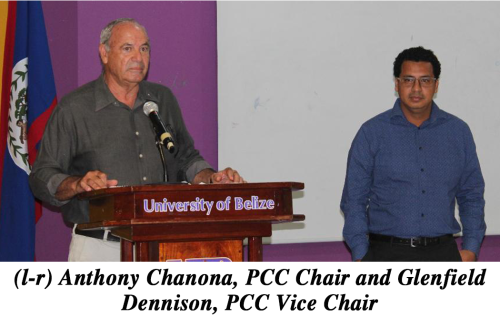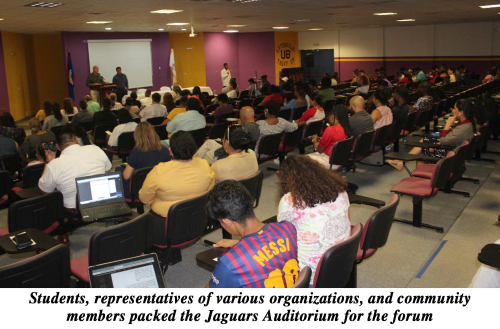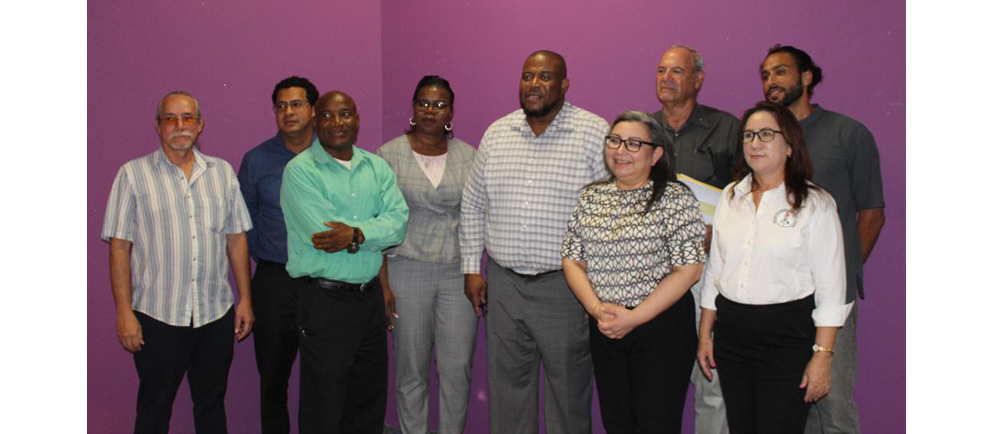Photo: (L-R) Cesar Ross, Head PCC Secretariat; Glenfield Dennison, PCC Vice Chair (back); Dr. Phillip Castillo, NCG Alternative; Dr. Sherlene Enriquez-Savery, UB Vice President; Dr. Vincent Palacio, UB President; Thea Garcia-Ramirez, Women’s Commission Representative; Ruth Shoman, BNTU Representative; Anthony Chanona, PCC Chair (back); Dr. Christopher DeShield, UB Representative (back)
by Marco Lopez
BELMOPAN, Wed. Mar. 1, 2023

The first three months of work for the People’s Constitutional Commission (PCC) have involved a great deal of capacity-building, and discussions on how to make the rigid, oftentimes hard-to-read Belize Constitution “sexy” — meaning a document that Belizeans will be able to understand and into which they will be motivated to peer. They fell short in the latter, but concluded that making the Constitution relatable would better achieve the goal of a widespread sensitization of the Belizean public and diaspora to the country’s supreme body of laws.
Leaders of the PCC and members representing a variety of sectors who are serving on a Public Outreach Education and Consultation Technical Committee met under the auspices of the University of Belize and the National Institute of Culture and History (NICH) at the Jaguar Auditorium yesterday on the UB Belmopan Campus. They discussed these and other updates before taking questions from students and other persons in attendance.
While the meeting was not an official part of the PCC’s pending education and consultation campaigns, it offered an opportunity for the public to get an idea of what the process will look like, and how they will play a part in constructing a new constitution for Belize. An education campaign to sensitize the public on the Belize Constitution is the first step. The special committee is currently in the process of drafting Terms of Reference to guide that process and establishing the goals of the commission.
“That is priority for us,” Ruth Shoman, Chair of the Public Outreach Education and Consultation Technical Committee, told us in an interview after the session yesterday. “We are currently working on it, and we are hoping that by the end of March, we have that portion completed,” Commissioner Shoman, who represents the Belize National Teachers Union on the PPC, explained.

The creation of a constitution for modern Belize is the goal of this process. To achieve this, the commissioners are seeking recommendations from the Belizean people in their various networks on the changes they see as necessary to achieve a higher quality of life and a better country.
Following what is anticipated to be a robust education campaign, a period of consultations with the Belizean public will take place over approximately five months or so. Commissioners/ representatives on the PCC will use their networks to reach as many citizens as possible in their communities to lend their voice to the process, said Dr. Christopher DeShield, UB representative on the Commission.
“We would definitely have to use existing networks – you know – they are networks of people where they trust the source of information and they disseminate information through there; and the commissioners that are a part of this thing have their own networks that they can use and engage,” Dr. DeShield shared. He also serves as the Vice-Chair of the Public Outreach Education and Consultation Technical Committee and mentioned that a focus on modes of communication is also a major consideration in the process.
“The other complication is, what strategy you use for conveying that information. Got feedback from certain groups that think things written will not be successful, probably a better mode of communication would be oral delivery, so all those kinds of consideration,” Dr. DeShield shared. Modes of communication to persons with diverse abilities and to marginalized communities were also highlighted as a key consideration.
This first step — the education campaign, will equip citizens at home and abroad to access user-friendly modes of communication that highlight key aspects of the Belize Constitution: our rights and liberties, governance system, and literally our definition as a country and people.
Public Outreach Committee Chairperson Shoman hopes that citizens will also ask questions about the Constitution and their rights based on their everyday experience.
“Maybe if they are not familiar with the Constitution — to say, ok, this happened to me; where in the Constitution does it say that it is okay for this to happen to me? And if it is not, what can I do to ensure that this does not happen to me or anybody else after this? That probably is going to help Belizeans understand what importance they bring to the process,” Shoman shared.
As mentioned, the PCC is already 3 months into an 18-month process, and may likely need an extension to the deadline to be allowed under the legislation to meet the goal of widespread consultation across Belize and the diaspora. Cesar Ross explained to us that the education and the consultation will possibly overlap, given the tight timelines. A timeline of events is to be published by the PCC social media team, and an online hub for the PCC is under construction to complement the interactive social media platforms.
The drafting of a final report which is to be handed to the Government of Belize is the objective. While the PCC does not have any powers to make any change to the Constitution, the commission is to act as a medium, gathering and collating information from the Belizean people and formulating, on the basis of these, sound recommendations for constitutional reform that are to be presented to the GoB.
We note that while the PCC Act schedule includes 21 member-representatives, two additions were made after the drafting of that schedule: the newly formed youth association YLAD, and the National Kriol Council. Meanwhile, long established organizations such as the Belize Rural Economic Development of Agriculture through Alliance (BREDDA) and the UBAD Educational Foundation (UEF), representing Belizeans in the diaspora and African heritage communities in Belize, respectively, have not been granted a place on the commission.
We note that the National Kriol Council held a similar educational session on the role of the PCC last Saturday at Swift Hall in Belize City.

